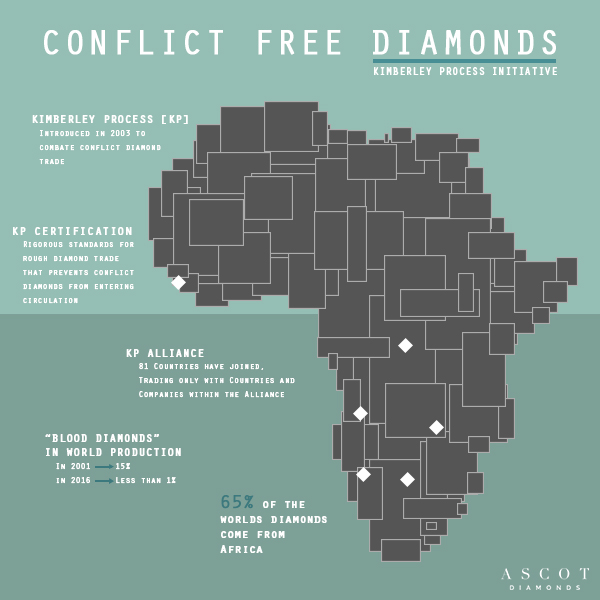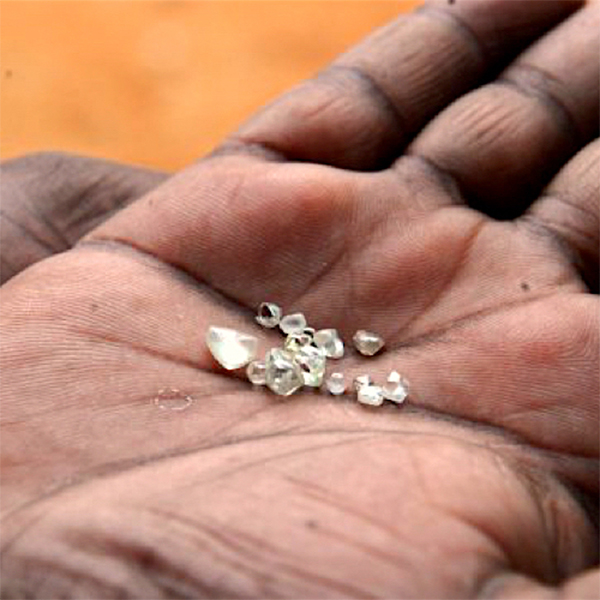Conflict Free Diamonds
Conflict Free Diamonds
About 20 years ago, the world became aware of the plight of diamond miners working for rogue operators in African countries in particular. Diamond merchants from around the world set the wheels in motion to establish dramatic changes and protocols to eliminate labor abuse and criminal operators from the supply chain. After admirable effort by diamond merchants from around the world, the Kimberley Process [KP] initiative was introduced to the world diamond trade in 2003 regarding conflict free diamonds.
The KP has since succeeded in almost eliminating the flow of ‘blood diamonds’ completely. In 2001 conflict diamonds represented approximately 15% of world production whereas today it represents less than 1%.


The KP is an international alliance of +- 80 countries committed to engage in diamond trade only with countries and companies who subscribe to the principles of the alliance. The goal was to dramatically improve working conditions for miners and prevent diamond sale proceeds from falling in the hands of outlaw forces promoting civil war and violence.
In the US, the Clean Diamond Trade Act of 2003 and Executive Order 13312 were used to legally commit the U.S. to the Kimberley Process and this provided the roadmap for implementation.
Naturally mined diamonds now a force for good:
Thanks to the success of the KP initiative, diamonds have become one of the most carefully monitored and audited natural resources in the world. Certification has prevented conflict diamonds from entering the supply chain and substantially reduced, if not eliminated diamond trade as an income source for rogue forces.
In Africa over the last dozen years the KP initiative has contributed positively to working conditions, the emergence of new cutting facilities and training resulting in better living conditions and opportunities.
African countries currently earn approximately $9 billion annually from diamond trade and the diamond rich country of Botswana has set standard by providing free education for every child and establishing an admirable secondary school system.
Approximately 40% of Namibia’s export earnings now come from diamonds improving the quality of life for the population of this vast, desolate country.
Banned from the diamond trade for human rights abuses in 2000, Sierra Leone has moved on from civil war since joining the Kimberley Process. Revenues from diamond exports represent the single most significant source of funds for this country now making progress with infrastructure, education and health services, thanks in no small measure to the natural diamond industry.


Key elements governing the Kimberley Process:
1.] Every rough diamond imported or exported must be accompanied by a KP certificate, sealed in a tamper resistant container. Diamond shipments without a certificate are not permitted to enter or leave the KP member country.
2.] Import or export of rough diamonds is permitted only between KP members.
3.] Rough diamond imports must be registered with U.S. Customs and Border Protection and all rough diamond exports have to be recorded in the Automated Export System.
4.] Rough diamond importers and exporters are obliged to store all KP certificates for five years and must file an annual activity report.
Every diamond in the Ascot Diamonds inventory is sourced exclusively from KP compliant manufacturers and we are proud to offer our clients the ‘best of the best’ conflict free diamonds from around the world.